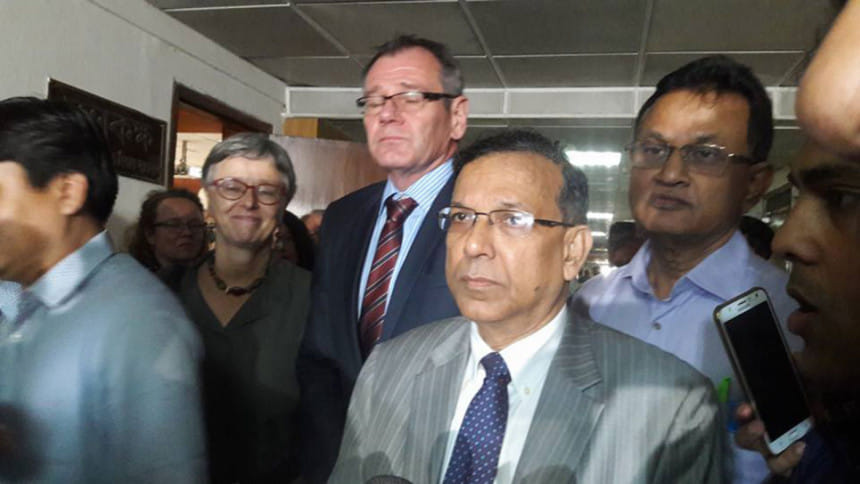Digital Security Act: Freedom of expression to get hurt

The European Union and 10 countries including the US and the UK have expressed concern over several sections of the proposed Digital Security Act-2018 as what they said is it “would suppress freedom of expression in multiple ways”.
Ambassadors of the countries and the EU or their representatives expressed their worry at a meeting with Law Minister Anisul Huq at his secretariat office in Dhaka yesterday.
The minister later said he assured them of considering their concern, and if necessary, changes or clarification would be made in the proposed act.
Already, local rights activists and journalists have raised voice against the draft act, saying they were frightened by the proposed law.
The cabinet on January 29 approved the draft act, which has to be passed in parliament.
The diplomats came up with concerns specifically over section 21, 25 and 28 of the draft law, which will deal with defamation, hurting religious sentiments or negative propaganda against the Liberation War or the Father of the Nation, using digital devices.
The 10 counties are Germany, Sweden, the US, Denmark, France, Canada, the UK, Spain, Norway and Switzerland. However, representatives of eight embassies or high commissions were present at yesterday's meeting, sources said.
After the meeting for over an hour, German Ambassador Thomas Prinz said, “We came here today [Sunday] as representatives of 11 embassies and high commissions [in Dhaka] to express our concern over the new draft of Digital Security Act as we know at this moment.
“The new act would suppress freedom of expression in multiple ways. We are particularly alarmed about the threat of severe punishment for merely expressing a belief or opinion, about the imprecise terminology which could lead to misinterpretation of law, non-availability of bail for certain offences and the empowerment of the security agency to detain a citizen without warrant by court.
“These were the main complaints we have discussed with the minister and we are very grateful that at the end of the discussion, the minister agreed to have a look in to these stipulations again, go back to the responsible ICT [Information Communication and Technology] ministry and then discuss with us again.”
The freedom of expression in this country will prevail, he hoped. “But we also see the necessity that digital security has to be established, cyber crimes have to be prevented.”
Later, the law minister told the reporters that concerns have been raised regarding sections 21, 25 and 28.
“These were the sections that we talked about … I have seriously listened to the points raised and I would take it back to the ministry of ICT and we will discuss this.”
Although they did not raise concern over section 32, it was discussed at the meeting, the minister said.
If necessary, he said, changes or clarification would be made, and he will again discuss the matter with the diplomats within a “reasonable time.”
No other issue was discussed at the meeting, he added.
Mohammad Shahidul Haque, senior secretary of Legislative and Parliamentary Affairs Division, and ASSM Zahirul Haque, secretary of Law and Justice Division, were also present at the meeting.
SECTIONS IN QUESTION
Section 21 says anyone who spreads negative propaganda against the Liberation War or the Father of the Nation, using digital devices, or instigates such acts will risk being sentenced up to 14 years' jail or a fine of up to Tk 1 crore or both.
He or she will face up to life imprisonment or Tk 3 crore fine or both for committing the offence for the second time, it said.
Section 25 of the proposed law says a person may face up to three years in jail or Tk 3 lakh fine or both if he or she is found to have deliberately published or broadcast in a website or electronic form -- something which is attacking or intimidating or which can make someone dishonest or disgruntled; if he or she knowingly publishes or broadcasts false and distorted (full or partial) information to annoy or humiliate someone, or to tarnish the image of the state or to spread rumour.
A person will face up to five years in jail or Tk 10 Lakh or both for committing the offence for second time, it said.
Section 28 says a person may face up to seven years in jail or Tk 10 lakh fine or both if he or she is found to have deliberately published or broadcast something in a website or in electronic form or get it done to hurt one's religious sentiment and values.
A person will face up to ten years in jail or Tk 20 lakh or both for committing the offence for the second time, it said.
Section 32 says a person may face up to 14 years in jail or Tk 20 lakh fine or both on the charge of spying if he or she illegally enters the offices of government, semi-government and autonomous bodies to gather information and uses electronic device to record something secretly.
If that person commits the crime again, he or she will face life imprisonment or a maximum fine of Tk 1 crore or both.
BACKGROUND
The government has formulated the act to combat growing cyber crimes that are affecting many public and private organisations including Bangladesh Bank.
The move came at a time when rights activists and journalists have been demanding repeal of section 57 of Information and Communication Technology Act for its “widespread misuse”.
Demand for repealing section 57 got momentum after around two dozen journalists were sued under the controversial provision last year. Some 701 cases filed under section 57 are pending with the lone cyber tribunal of the country till January.
Although it was said that section 57 of the ICT act would be revoked once the draft is passed in parliament, journalists and right activists felt duped by the government as the provision was kept in the proposed law with some changes.
Section 57 deals with defamation, hurting religious sentiments, causing deterioration of law and order and instigating against any person or organisation through publishing or transmitting any material in websites or in electronic form.
It stipulates maximum 14 years in prison for the offences.
The draft of Digital Security Act-2018 splits these offences into four separate sections (21, 25, 28 and 29) with punishment ranging from three to 10 years' jail term.
The proposed law describes some crimes as “non-bailable” and allows a police official to search or arrest anyone without a warrant in special circumstances.
Against the continuous criticism, Road Transport and Bridges Minister Obaidul Quader on February 15 urged the journalist community not to worry about the proposed act, saying all stakeholders would be consulted before getting it passed.

 For all latest news, follow The Daily Star's Google News channel.
For all latest news, follow The Daily Star's Google News channel. 








Comments